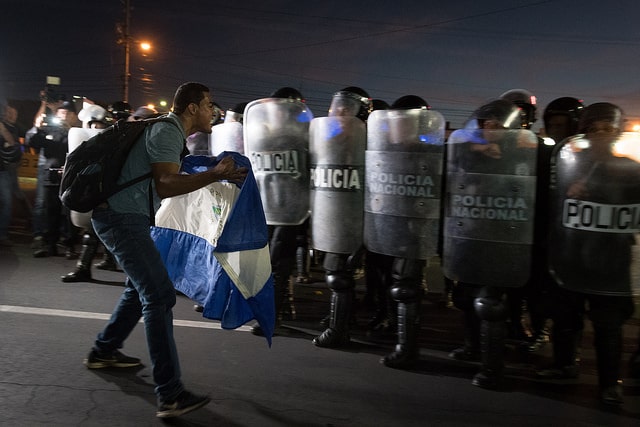4 de junio 2021

Children of Exile: The Births “Sowing Hope” in the Camp of Nicaraguan Farmers

PUBLICIDAD 1M
PUBLICIDAD 4D
PUBLICIDAD 5D
The citizens and candidates representing Nicaragua’s opposition political majority find themselves totally defenseless

Nicaragua needs civil resistance. It may or may not suffice to get rid of the Ortega Murillos
On Tuesday, June 1st, the Prosecutor’s office announced President Daniel Ortega’s order to bar Cristiana Chamorro from running for president. The de facto decree stated that she had lost her political rights because she’s facing a criminal investigation for alleged money laundering. That investigation was launched by Ortega, who’s running again for reelection himself.
The order to disqualify Chamorro’s candidacy was issued the very same day that my sister – formerly president of the Violeta Barrios de Chamorro Foundation – announced her intention to register for the internal competition taking place in the Citizens for Liberty Alliance to choose their presidential candidate.
As such, she’d be competing with seven other aspiring candidates for the party nomination. Candidates Juan Sebastian Chamorro, Arturo Cruz, Noel Vidaurre and Americo Treminio have already registered with the party, while Felix Maradiaga, Medardo Mairena and Luis Fley are in the process of registering. The idea is to select one sole candidate to represent the opposition.
The prohibition order against Cristiana Chamorro is a new blow against Nicaraguans’ right to political competition. In the last eight months, at least four of the announced presidential candidates have been subjected to police harassment and house arrest. At the same time, the legal status of the Democratic Restoration Party was abruptly and illegally cancelled.
The de facto proscription decreed against Cristiana Chamorro is illegal. It violates her right to defense. As of yet, there’s been no legal ruling, but at any moment, the presidential decree could become a formal order to disqualify. This is likely, since the judges and the Supreme Electoral Council are controlled by the FSLN. These bodies have already received Ortega’s order to declare a guilty verdict, to be implemented on a discretionary basis.
These are the consequences of the coup d’etat that was consummated from President Daniel Ortega’s seat of power. First, by dismantling the Rule of Law and eliminating the separation of government powers. Later, following the assassinations of April 2018 and the “Operation Clean-up” that followed, by truncating in practice all Constitutional rights and freedoms.
In Nicaragua, the only “coup plotters” are in El Carmen, the presidential residence. There can only be free, transparent, and competitive elections if the Police State imposed by the executive is suspended.
The citizens, candidates, and the blue and white opposition majority in Nicaragua currently find themselves completely defenseless. The only path to recover our freedoms is to relaunch the civic resistance.
That’s the challenge that today’s political leaders, presidential candidates and all the active forces of the country must confront. That includes the public servants, both civilian and military, the large business owners and the private sector associations, and the leaders of the Catholic Church. All must work to consolidate a true national unity, one that succeeds in galvanizing the support of the international community to isolate the dictatorship.
The people have a right to demonstrate to recover their freedom of assembly and mobilization, and demand the suspension of the Police State. This must be done until there’s an electoral reform – with or without Ortega and Murillo – that would allow Nicaraguans to have free elections with international observation.
Nicaragua demands competitive elections, in which the parties and candidates competing against the FSLN are not eliminated beforehand, out of Daniel Ortega’s fearful certainty that he’ll lose power.
Free elections, without barring candidates for the presidency or the legislature from running. The electoral farce of 2016, a reelection without political competition, must not be repeated.
The citizenry should be able to decide on November 7th between two options in a great plebiscite: dictatorship or democracy. They could choose between Ortega, and the single opposition candidate. They could decide if they want five years more of dictatorship, or the democratic change with justice that the April rebellion demanded three years ago, to end the dictatorship.
This article was originally published in Spanish in Confidencial and translated by Havana Times
Archivado como:
PUBLICIDAD 3M
Periodista nicaragüense, exiliado en Costa Rica. Fundador y director de Confidencial y Esta Semana. Miembro del Consejo Rector de la Fundación Gabo. Ha sido Knight Fellow en la Universidad de Stanford (1997-1998) y profesor visitante en la Maestría de Periodismo de la Universidad de Berkeley, California (1998-1999). En mayo 2009, obtuvo el Premio a la Libertad de Expresión en Iberoamérica, de Casa América Cataluña (España). En octubre de 2010 recibió el Premio Maria Moors Cabot de la Escuela de Periodismo de la Universidad de Columbia en Nueva York. En 2021 obtuvo el Premio Ortega y Gasset por su trayectoria periodística.
PUBLICIDAD 3D